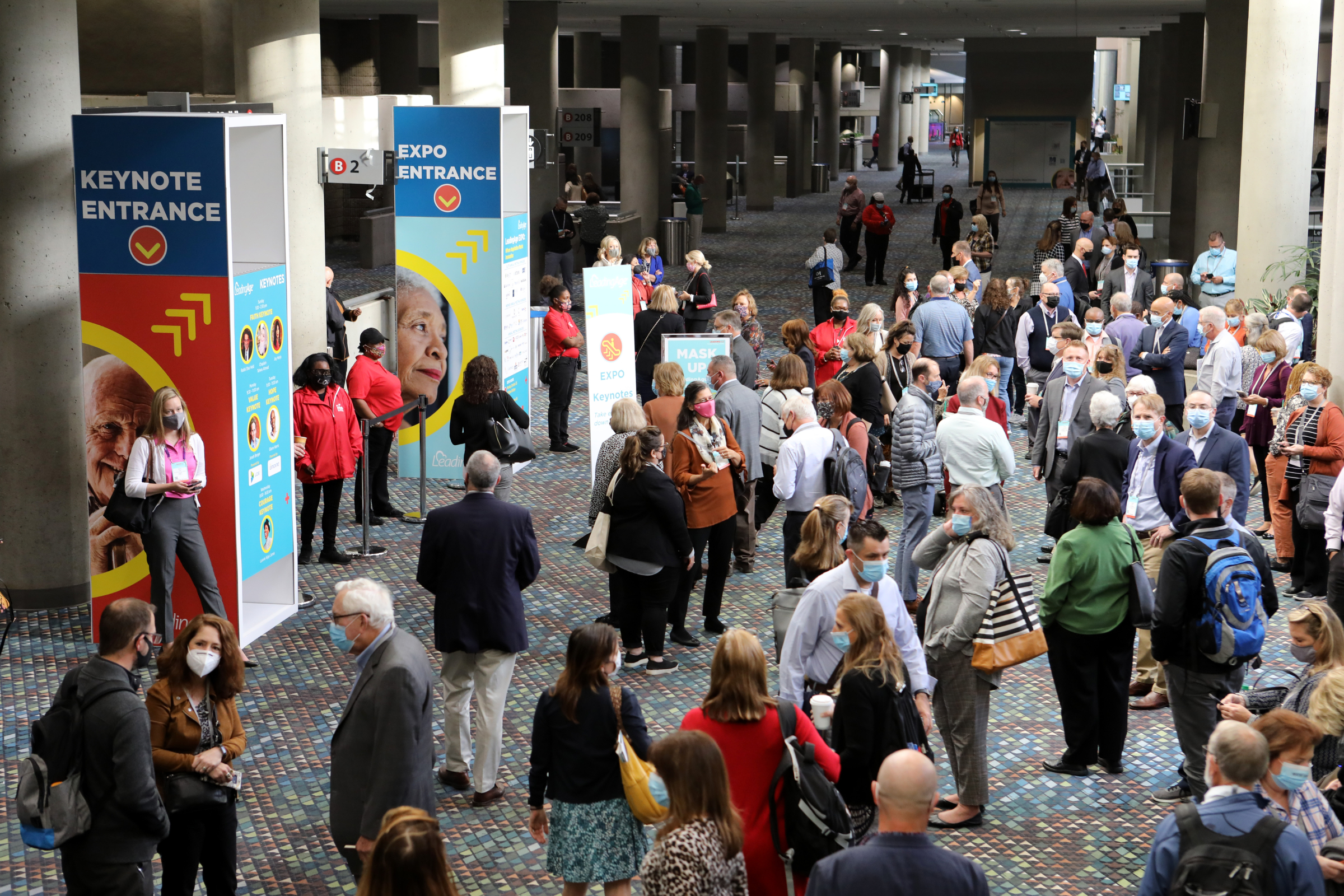Aging Services Highlights in the Administration’s Proposed FY 23 Budget
Telehealth
Investments in telehealth are scattered across the FY 2023 budget request, with funding requests sought by the Centers for Medicare and Medicaid Services (CMS), Department of Health and Human Services (HHS) Office of Inspector General, Health Resources and Services Administration (HRSA) and Federal Communications Commission (FCC). The Administration has noted, telehealth, specifically audio-only telehealth, can greatly increase access to services for individuals who may not have sufficient bandwidth or technology to support 2-way audio-video, particularly in underserved areas and among older populations.
The budget supports new Agency for Healthcare Research and Quality (AHRQ) Long COVID research and diagnostic safety research, the development of an all-payer claims database, and activities to evaluate the effects of telehealth on healthcare delivery and health outcomes, and funding to support the establishment of two Centers of Excellence in Telehealth Implementation. These centers will play a role in evaluating the effects of telehealth on healthcare delivery and health outcomes to ensure the promise of telehealth is delivered through evidence-based practice and policy. This work is especially important given the rapid expansion of telehealth during the COVID-19 pandemic, which created both historic opportunities and unique challenges.
The Administration also supports expanding access to mental health and beneficiary-centered care under Medicare via greater use of telehealth and other telecommunications technologies to provide behavioral healthcare, among other services. Medicare beneficiaries can experience care directly in their homes thanks to recent regulations, including the Calendar Year (CY) 2022 Physician Fee Schedule final rule, that allow for certain behavioral health services via audio-only telephone calls.
Workforce
Geriatrics Health Care Workforce Partnerships and Career Awards Programs. The Budget includes an increase of $3.8 million for HRSA’s Geriatrics Workforce Enhancement Program (GWEP), which awards grants to strengthen the health care workforce, increase outreach, and improve health outcomes for older adults by integrating geriatrics and primary care delivery sites/systems. The Program maximizes patient and family engagement in health care decisions and provides training focusing on interprofessional and team-based care across the educational continuum (students, faculty, providers, direct service workers, patients, families, and lay and family caregivers). An essential component of the program is developing academic-primary care-community-based partnerships to address gaps in health care for older adults and transforming clinical training environments into integrated geriatrics and primary care sites/systems to become age-friendly health systems and dementia-friendly communities.
The request will also fund the Geriatrics Academic Career Awards (GACA) Program to support junior level faculty in geriatrics programs who will provide interprofessional clinical training and become leaders in academic geriatrics.
National Apprenticeship Program. The Department of Labor requests an increase of $118 million in funding for National Apprenticeship activity. The Department will use these resources to expand Registered Apprenticeship opportunities while increasing access for historically underrepresented groups, including people of color and women, and diversifying the industry sectors involved. The increase will also enhance the Department’s support for pre-apprenticeships, youth apprenticeships, and degreed apprenticeships to ensure that more Americans have career pathways to good jobs.
Immigration
USCIS Visa Petition and Application Backlog. United States Citizenship and Immigration Services (USCIS), the agency responsible for administering the Nation’s immigration system, requests $389 million and 1,558 full time employees (FTE) for continued support for the multiyear effort to reduce the visa application and petition backlog, as well as fully support the USCIS International and Refugee Affairs Division, a partner in the U.S. Refugee Admissions Program. The funding will help hire additional staff to process foreign health care workers who have been waiting for permission to enter the U.S. through employment-based visa petitions. The refugee admissions funding will support additional staff and travel costs associated with international circuit rides for refugee processing.
Nursing Homes
Pandemic Preparedness and Infection Control. The Administration is allocating $200 million in pandemic preparedness authorized under the American Rescue Plan Act. This funding will enable CMS-contracted Quality Improvement Organizations (QIOs) to increase vaccination rates for residents and staff, mitigate outbreaks, and strengthen infection control systems.
Staffing Transparency. To increase transparency and oversight the Administration has made nursing home staff turnover rates and weekend staff levels publicly available to Medicare beneficiaries and all healthcare consumers for the first time ever. This data, available on Medicare.gov/care-compare, provides consumers with more information about each nursing home facility’s staffing environment. In addition, via the National Healthcare Safety Network, beneficiaries are also able to see national and state level data on COVID-19 vaccination coverage among nursing home residents and staff.
Survey and Certification. The Budget requests $494 million for Survey and Certification, an increase of $97 million or 24 percent above FY 2022, to support health and safety inspections at approximately 67,000 participating Medicare or Medicaid provider facilities. At this level of funding, CMS projects that states will have the resources to fully complete surveys for all provider types, including complaint surveys, statutorily required surveys, and non-statutory surveys. Furthermore, CMS will improve oversight of nursing facilities, including an overhaul of the special focus facility program to improve care more quickly for low-performing nursing homes.
Mental and Behavioral Health
The HHS budget overall has a large focus on mental and behavioral health. While the money is not specifically targeted at aging services, there is a lot of potential opportunity for LeadingAge members to look at new funds to help partner in their communities to gain access to mental health resources for residents, clients, and staff.
- The budget includes $397 million dollars for Behavioral Health Workforce Development Programs which will focus on training paraprofessionals, increasing the overall numbers of behavioral health providers in the workforce, and promoting team-based care.
- Importantly for LeadingAge members is a focus on the frontline health care workforce. There is a $50 million dollar commitment for preventing burnout in the health workforce with a focus on health workforce retention and recruitment, particularly in the behavioral health workforce.
- $7.5 billion is proposed for a Medicaid demonstration to improve mental health provider capacity.
- The Administration proposes that Congress require Medicare to cover three behavioral health visits without cost sharing.
- The Administration also proposes that Congress modernize Medicare mental health benefits including expanding the providers who can bill and be paid for mental health services in the Medicare program, removing limits on scopes of service from existing provider categories likes social workers including allow them to bill directly for services provided during a Part A skilled nursing facility stay.
Family Services and Supports
The Administration for Community Living (ACL) proposes to increase funding for Adult Protective Services, Family Caregiver and Native American Caregiver Support program, and the Lifespan Respite Care program.
Additional Relevant Legislative Proposals
In addition to the budgetary requests highlighted above, the Administration included the following legislative proposals as action items for Congress:
- Allowing CMS to require all Medicare providers, contractors, and suppliers to collect and report relevant data under a declared PHE and to enforce these data collection requirements with intermediate penalties.
- Proposes to add to IMPACT Act post-acute care data standardization reporting requirements a new category to require the collection of data on social determinants of health or “drivers of health.” These factors could include transportation, housing, social isolation, and food insecurity.
- Proposes to enhance Medicaid managed care enforcement by amending federal Medicaid statute to condition federal match in Medicaid managed care plan contract capitation payment amounts on a service-by-service basis and provide CMS with additional enforcement options. This proposal would create parity in CMS’ enforcement authority between Medicaid managed care and Medicaid FFS.

Most Recommended
November 08, 2024
 HOTMA: New Rules for Housing
HOTMA: New Rules for Housing
November 06, 2024
 Colleagues on the Move, November 6, 2024
Colleagues on the Move, November 6, 2024
November 06, 2024
 Analysis: What Does the Final CY2025 Home Health Rule Include?
Analysis: What Does the Final CY2025 Home Health Rule Include?
October 29, 2024
Katie Smith Sloan Urges Members to Build a Movement, Take Action
Recently Added
December 10, 2024
4 Top Tech Themes from 2024
December 09, 2024
 Analysis: What’s Changing with the Home Health CAHPS Survey?
Analysis: What’s Changing with the Home Health CAHPS Survey?
December 09, 2024



